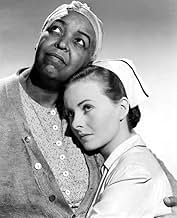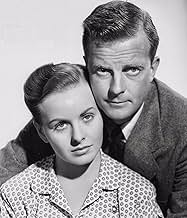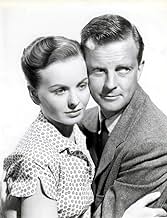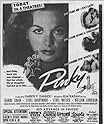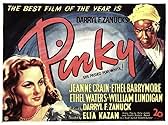CALIFICACIÓN DE IMDb
7.2/10
3.5 k
TU CALIFICACIÓN
Una enfermera negra de piel clara regresa a su pueblo y debe cuidar a una anciana maestra muribunda.Una enfermera negra de piel clara regresa a su pueblo y debe cuidar a una anciana maestra muribunda.Una enfermera negra de piel clara regresa a su pueblo y debe cuidar a una anciana maestra muribunda.
- Nominado a 3 premios Óscar
- 4 nominaciones en total
Fred Aldrich
- Townsman
- (sin créditos)
Shelby Bacon
- Boy
- (sin créditos)
Betty Beard
- Minor Role
- (sin créditos)
Rene Beard
- Teejore
- (sin créditos)
Arthur Berkeley
- Townsman
- (sin créditos)
Patsy Boniface
- Minor Role
- (sin créditos)
Mildred Boyd
- Nurse
- (sin créditos)
Argumento
¿Sabías que…?
- TriviaJohn Ford was the original director of the film but after seeing dailies, Darryl F. Zanuck felt Ford wasn't connecting with the material. Zanuck called Elia Kazan in New York and asked him to take over the film. Kazan felt he owed Zanuck for his film career and agreed to do the movie without even looking at the script. He flew to Los Angeles and started filming the next Monday.
- ErroresWhen the white officer slaps Rozelia on the left side of her face, she mistakenly rubs the right side of her face.
- Citas
Pinky Johnson: I'm a Negro. I can't forget it, and I can't deny it. I can't pretend to be anything else, and I don't want to be anything else. Don't you see, Tom?
Dr. Thomas Adams: No, I don't.
Pinky Johnson: You can't live without pride.
- ConexionesFeatured in Biography: Darryl F. Zanuck: 20th Century Filmmaker (1995)
Opinión destacada
I saw this film some years after it came out, in a Texas Baptist orphans home, as a preadolescent. In the years to follow, I developed a fascination for Ethel Waters, esp. when I saw her interpretation of Carson McCuller's "A Member of the Wedding".
When I saw the film tonight on American Movie Classics, a lot of years had passed since first having seen it. Ethel Waters' performance struck me as cowed and subservient. In the court scene while being questioned by the plaintiff's council, she actually flinched when he raised his voice. ...And I'm thinking, 'Damn, that woman is really intimidated.' Having read her autobio, as well as a bio on her, I'm aware that not one woman in a million suffered through a similar childhood: a b*****d born of a 13-year-old rape victim - unwanted and shuffled from pillar to post to eventually become a washerwoman...it's a wonder she survived.
Yet survive she did. Not surprisingly, she had a monster chip on her shoulder. It is my understanding that John Ford, the man who was to direct "Pinky", had such a run-in with Miss Waters that he quit, and Kazan took over. The word is that neither could stand the sight of the other.
The movie is an important one - and I'd like to think that the reason goes beyond the juxtapositioning of America's treatment of blacks in the Forties with today's suffocating PC standards. There is the understated acting, for one thing. Ethel Barrymore always played the dignified albiet intimidating elderly lady in her later years. Yet in "Pinky", she is strong without being absurdly powerful. How well that woman delivers her lines...!
What I also liked was, while the white majority were unkind to Pinky, I can attest as a Southerner (well, Texan), that Kazan presented them truthfully. He only demonized one woman: the older cousin-plaintiff.
It is surprising that this film wasn't presented in a more gritty format; that there wasn't more preaching in it, that it wasn't condescending to whites. None of these failings mar this splendid film. Forty years after having seen it, I realize a superb gentleness that isn't to be found in American films. At a guess, that's because a generation ago most films were made for 30-and-over adults, whereas today they're almost exclusively made for 13 - 25 year olds.
I will give "Pinky" my highest compliment: It is literary.
When I saw the film tonight on American Movie Classics, a lot of years had passed since first having seen it. Ethel Waters' performance struck me as cowed and subservient. In the court scene while being questioned by the plaintiff's council, she actually flinched when he raised his voice. ...And I'm thinking, 'Damn, that woman is really intimidated.' Having read her autobio, as well as a bio on her, I'm aware that not one woman in a million suffered through a similar childhood: a b*****d born of a 13-year-old rape victim - unwanted and shuffled from pillar to post to eventually become a washerwoman...it's a wonder she survived.
Yet survive she did. Not surprisingly, she had a monster chip on her shoulder. It is my understanding that John Ford, the man who was to direct "Pinky", had such a run-in with Miss Waters that he quit, and Kazan took over. The word is that neither could stand the sight of the other.
The movie is an important one - and I'd like to think that the reason goes beyond the juxtapositioning of America's treatment of blacks in the Forties with today's suffocating PC standards. There is the understated acting, for one thing. Ethel Barrymore always played the dignified albiet intimidating elderly lady in her later years. Yet in "Pinky", she is strong without being absurdly powerful. How well that woman delivers her lines...!
What I also liked was, while the white majority were unkind to Pinky, I can attest as a Southerner (well, Texan), that Kazan presented them truthfully. He only demonized one woman: the older cousin-plaintiff.
It is surprising that this film wasn't presented in a more gritty format; that there wasn't more preaching in it, that it wasn't condescending to whites. None of these failings mar this splendid film. Forty years after having seen it, I realize a superb gentleness that isn't to be found in American films. At a guess, that's because a generation ago most films were made for 30-and-over adults, whereas today they're almost exclusively made for 13 - 25 year olds.
I will give "Pinky" my highest compliment: It is literary.
- IRVIN8
- 17 oct 2001
- Enlace permanente
Selecciones populares
Inicia sesión para calificar y agrega a la lista de videos para obtener recomendaciones personalizadas
- How long is Pinky?Con tecnología de Alexa
Detalles
Taquilla
- Total en EE. UU. y Canadá
- USD 4,200,000
- Tiempo de ejecución1 hora 42 minutos
- Color
- Relación de aspecto
- 1.37 : 1
Contribuir a esta página
Sugiere una edición o agrega el contenido que falta

Principales brechas de datos
By what name was Lo que la carne hereda (1949) officially released in India in English?
Responda

